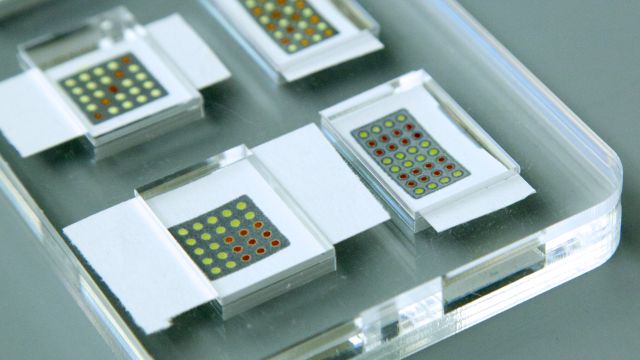
Ebola strains can be detected in just 30 minutes outside of the lab by a test that uses pocket-sized slips of blotting paper, a pioneering study revealed today.
By manipulating the genetic machinery of cells and embedding them in the fine matrix of paper, a prototype Ebola test has been developed using just $20 of materials.
Leading pioneer in the field of synthetic biology James Collins, who co-headed the teams leading the research, told Newsweek: "This is one of our biggest breakthroughs, one that I hope will have a positive impact, improving the lives of individuals worldwide."
Remarkably, the tests took the team only 12 hours to develop.
The new research was revealed in two studies released in the journalCell today by scientists at the Wyss Institute for Biologically Inspired Engineering. The studies show how advances in synthetic biology will enable us to detect and identify complex cellular reactions occurring outside of living cells, including those that occur in certain strains of the Ebola virus.
Using just a drop of saliva or blood, these reactions could identify specific disease or infection outside of the laboratory within minutes.
The first study, titled 'Paper-Based Synthetic Gene Networks' shows how cheap, commercially available materials can be used to build a wide variety of paper-based biosensors that can detect the presence of specific chemicals, such as those present in certain Ebola strains. Once built, these paper-based tools can then be freeze-dried for safe storage and shipping. They can also be stored effectively for up a year at room temperature, a huge advantage in large areas of the world where electricity is unreliable or there are no refrigerators.
"We've harnessed the genetic machinery of cells and embedded them in the fiber matrix of paper, which can then be freeze dried for storage and transport — we can now take synthetic biology out of the lab and use it anywhere to better understand our health and the environment," said the lead author of the study and Wyss Staff Scientist Keith Pardee, PhD.
Once freeze-dried, the paper can be reactivated by simply adding water.
To prove their concept, Collins and Pardee used the paper-based method to detect strain-specific Ebola virus. To do this, RNA, which plays a vital role in transferring information from DNA for controlling the synthesis of proteins, was programmed so that it only reacted with the particular strain of the virus the researchers were seeking to detect.
Dots on the paper change from yellow to purple within half an hour to indicate if the specific strain is present.
"In a period of just 12 hours, two of my team managed to develop 24 sensors that would detect different regions of the Ebola genome, and discriminate between the Sudan and the Zaire strains," Collins told the BBC.
As well as Ebola, antibiotic resistance in genes in bacterial infections or biomarkers of other disease conditions could be detected, simply by changing the input trigger.
However, Collins told Newsweek that the tests cannot yet be used to identify Ebola in areas where there is an epidemic. "Our work is at present limited to academic proof-of-principle demonstrations. We currently have detection into the picomolar range, but to make the system practical for field applications this will have to be improved. We have a number of technologies under development that promise to provide the boost to sensitivity that we need."
Uncommon Knowledge
Newsweek is committed to challenging conventional wisdom and finding connections in the search for common ground.
Newsweek is committed to challenging conventional wisdom and finding connections in the search for common ground.
About the writer
To read how Newsweek uses AI as a newsroom tool, Click here.








